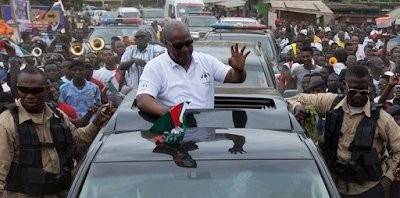During a recent visit to Ghana's Ashanti Region, a stronghold of the New Patriotic Party (NPP), former President John Dramani Mahama encountered an unexpected obstacle orchestrated by local NPP supporters. Mahama, the flagbearer for the National Democratic Congress (NDC), had intended to hold a series of engagements with community members to share his vision for Ghana should he be re-elected. However, upon his arrival, he was met with fierce resistance from NPP loyalists who blocked his convoy and demanded that he leave the area.
The atmosphere was charged as supporters shouted, “Go back! We don’t want you here!†while waving NPP flags vigorously. Their actions reflected deep-seated dissatisfaction with Mahama’s previous administration, with many asserting that his policies during his tenure did not adequately benefit the Ashanti Region. This sentiment has been echoed by a significant portion of the local populace, who feel disconnected from the policies of the former president.
In response to the confrontation, Mahama's campaign team emphasized the fundamental principle of political openness, arguing that all Ghanaians deserve the opportunity to hear from every candidate. One member of his team articulated this philosophy, stating, “Blocking Mahama’s convoy only limits people’s access to information.†This sentiment underscores a broader commitment to democratic engagement, where citizens are encouraged to hear diverse perspectives, regardless of their political affiliations.
Despite the hostility, Mahama is known for his composed demeanor, and he chose to avoid escalating tensions. He rerouted his convoy to ensure the safety of both his team and the local residents. Before leaving the area, he took a moment to address a small gathering of his supporters, expressing his gratitude for their loyalty and reiterating his commitment to connecting with citizens throughout Ghana, including those in regions where opposition candidates face significant challenges.
Political analysts have interpreted this incident as a vivid illustration of the ongoing rivalry between the NPP and the NDC, particularly within the Ashanti Region. This region has historically demonstrated unwavering support for the NPP, creating substantial hurdles for opposition candidates like Mahama who seek to engage with the electorate. The dynamics of political loyalty in this area are well-established, and the incident serves as a reminder of the challenges faced by those attempting to break through entrenched loyalties.
The significance of this confrontation extends beyond Mahama’s immediate campaign. It underscores the broader political landscape in Ghana, where regional loyalties can significantly influence electoral outcomes. The Ashanti Region, being a bastion of NPP support, poses unique challenges not only for Mahama but for any candidate representing opposition parties. Engaging with constituents in such an environment requires a nuanced approach, with an emphasis on dialogue and understanding.
Mahama's experience reflects the complexities of Ghana's political environment, where passionate support for parties can sometimes lead to confrontational encounters. As the electoral season heats up, such incidents may become more frequent, highlighting the polarized nature of Ghanaian politics. The need for fostering a culture of open dialogue and mutual respect among different political factions is more critical than ever, ensuring that all voices are heard in the democratic process.


